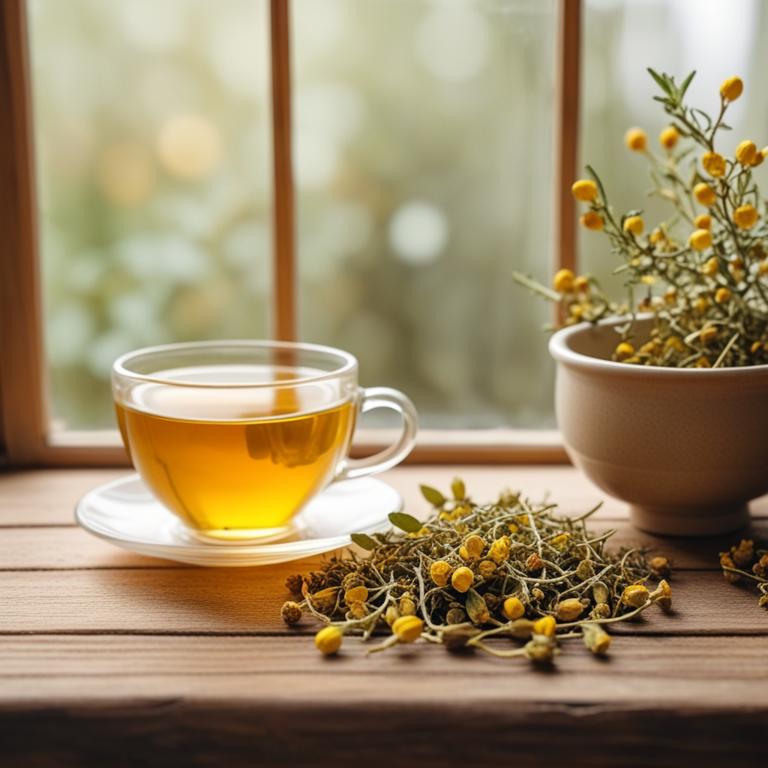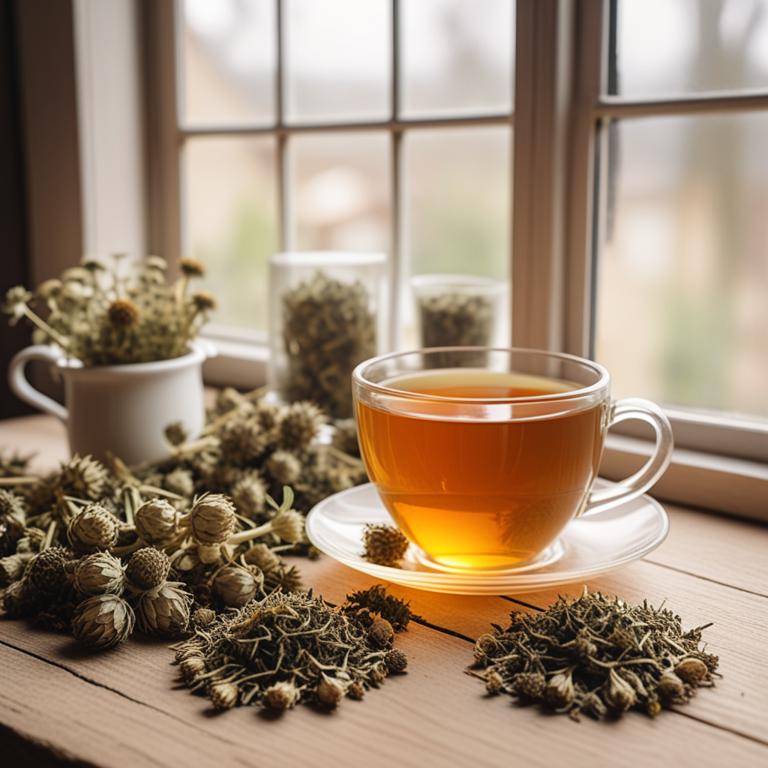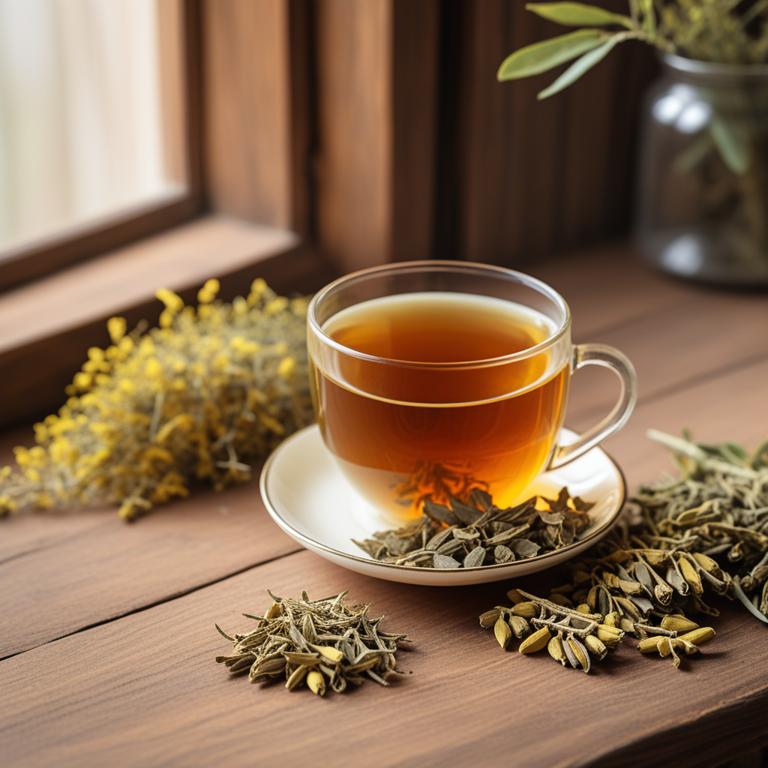7 Best Herbal Teas For Urinary Calculus

Herbal teas for urinary calculus are a natural remedy used to treat kidney stones or stones in the urinary tract.
These herbal teas are made from various plants and herbs that have been found to have diuretic, anti-inflammatory, and antioxidant properties, which help to prevent the formation of stones, reduce pain, and promote the passage of stones.
Some examples of herbal teas used to treat urinary calculus include juniper berries, which help to reduce inflammation and promote urine production; dandelion root, which acts as a natural diuretic and helps to flush out toxins; uva ursi, which has antibacterial properties that prevent infections; and parsley, which helps to reduce the formation of stones by increasing urine pH.
Additionally, other herbal teas such as corn silk, hydrangea, and stone root have also been found to be effective in treating urinary calculus due to their ability to reduce inflammation, promote urine production, and prevent the formation of stones.
According to "Journal of the Medical Association of Thailand = Chotmaihet thangphaet", teas for urinary calculus may be beneficial for preventing uric acid stone formation due to increased urine alkalinity after consumption, particularly with Yaa-Knuatmaeo or Folia orthosiphonis tea.
Below there's a list of the 7 best herbal teas for urinary calculus.
- 1. Ammi visnaga teas
- 2. Berberis vulgaris teas
- 3. Glycyrrhiza glabra teas
- 4. Lithospermum officinale teas
- 5. Urtica dioica teas
- 6. Arctium lappa teas
- 7. Cassia angustifolia teas
Also you may be interested in...
TODAY'S FREE BOUNDLE
Herb Drying Checklist + Herbal Tea Shopping List + Medicinal Herbs Flashcards
Enter you best email address below to receive this bundle (3 product valued $19.95) for FREE + exclusive access to The Aphotecary Letter.
$19.95 -> $0.00
1. Ammi visnaga teas

Ammi visnaga teas have been traditionally used to treat the urinary calculus ailment, also known as kidney stones.
The properties of this herbal preparation that help to treat this ailment include its diuretic and anti-inflammatory effects, which aid in flushing out the stones and reducing pain and discomfort.
The bioactive constituents of ammi visnaga, such as alkaloids and sesquiterpenes, help to break down and dissolve the stones, making it easier to pass them out of the body.
By treating urinary calculus with ammi visnaga teas, individuals can benefit from reduced pain and discomfort, improved urinary function, and a lower risk of complications associated with kidney stones.
Related Study
According to "Journal of ethnopharmacology", Ammi visnaga teas for urinary calculus have been traditionally used and recent studies have reported that isolated phytochemicals from this plant, such as visnagin, have potent antiurolithiatic activity.
2. Berberis vulgaris teas

Berberis vulgaris teas have been traditionally used to treat the urinary calculus ailment, a condition characterized by the formation of kidney stones.
The properties of this herbal preparation, such as its diuretic and anti-inflammatory effects, help to treat this ailment by increasing urine production and reducing inflammation in the urinary tract.
The bioactive constituents of Berberis vulgaris, including berberine, berbamine, and oxyberberine, exhibit spasmolytic and antiseptic properties that help to break down and eliminate kidney stones.
The benefits of using Berberis vulgaris teas to treat urinary calculus include reduced pain and discomfort, improved urinary function, and a lower risk of complications associated with kidney stones.
Related Study
According to the given study, Berberis vulgaris teas for urinary calculus have been used as a prominent herbal remedy in the Homeopathic system of medicine for kidney pain and the removal of kidney stones.
3. Glycyrrhiza glabra teas

Glycyrrhiza glabra teas have been used traditionally to treat urinary calculus, a condition characterized by the formation of kidney stones.
The diuretic and anti-inflammatory properties of this herbal preparation help to treat this ailment by increasing urine production and reducing inflammation in the urinary tract, thereby preventing the formation of kidney stones and alleviating symptoms such as pain and discomfort.
The bioactive constituents of Glycyrrhiza glabra teas, including glycyrrhizin, flavonoids, and saponins, play a crucial role in treating urinary calculus by inhibiting the growth of bacteria that contribute to the formation of kidney stones and reducing oxidative stress in the body.
The benefits of using Glycyrrhiza glabra teas to treat urinary calculus include its ability to reduce the risk of kidney stone recurrence, alleviate symptoms such as pain and discomfort, and promote overall urinary health.
Related Study
According to "Journal of alternative and complementary medicine (New York, N.Y.)", Glycyrrhiza glabra teas for urinary calculus have shown antioxidant capacity comparable to that of Silybum marianum (milk thistle) seed and Camellia sinensis (tea) leaf, which may be responsible for their reputation in protecting organs of the urinary system.
4. Lithospermum officinale teas

Lithospermum officinale teas have been traditionally used to treat the urinary calculus ailment, also known as kidney stones, due to their diuretic and anti-inflammatory properties.
The herbal preparation helps to treat this ailment by increasing urine production and reducing pain and inflammation associated with kidney stones.
The bioactive constituents of Lithospermum officinale, including flavonoids and phenolic acids, contribute to its diuretic and anti-inflammatory effects, which aid in the dissolution and removal of kidney stones.
The benefits of using Lithospermum officinale teas to treat urinary calculus include reduced symptoms, improved kidney function, and a reduced risk of complications associated with kidney stones.
Related Study
According to "Pharmacognosy magazine", Lithospermum officinale teas, which are part of the polyherbal decoction SK, have been found to prevent the formation of renal calculi and renal damage in ethylene glycol and sodium oxalate-induced urolithiasis in rats, by promoting diuresis, maintaining an alkaline environment in the urinary system, and restoring antioxidant levels.
5. Urtica dioica teas

Urtica dioica teas have been traditionally used to treat the urinary calculus ailment, which is characterized by the formation of kidney stones.
The diuretic and anti-inflammatory properties of this herbal preparation help to treat this ailment by increasing urine production and reducing inflammation in the urinary tract.
The bioactive constituents of Urtica dioica, including flavonoids, phenolic acids, and saponins, play a crucial role in treating urinary calculus by inhibiting the growth of bacteria and reducing the formation of kidney stones.
The benefits of Urtica dioica teas in treating urinary calculus include reduced pain and discomfort, improved urine flow, and prevention of further stone formation.
Related Study
According to the study, Urtica dioica teas may be beneficial for urinary calculus due to the presence of antiurolithiatic compounds, which have been isolated from the genus Urtica, although the specific effects of Urtica dioica on urinary calculus are not detailed in this study.
6. Arctium lappa teas

Arctium lappa teas have been traditionally used to treat the urinary calculus ailment, a condition characterized by the formation of kidney stones.
The properties of this herbal preparation, including its diuretic, anti-inflammatory, and antioxidant properties, help to treat this ailment by increasing urine production and reducing inflammation in the urinary tract.
The bioactive constituents of Arctium lappa teas, such as flavonoids, phenolic acids, and sesquiterpenes, are responsible for its therapeutic effects, which include inhibiting the growth of bacteria and reducing the formation of kidney stones.
The benefits of Arctium lappa teas in treating urinary calculus include reducing the risk of stone recurrence, alleviating symptoms such as pain and nausea, and promoting overall urinary health.
Related Study
According to "Journal of ethnopharmacology", Arctium lappa teas for urinary calculus have been reported to have antiurolithiatic activity, potentially helping to dissolve or inhibit the formation of urinary stones.
7. Cassia angustifolia teas

Cassia angustifolia teas have been traditionally used to treat the urinary calculus ailment due to their diuretic, anti-inflammatory, and antioxidant properties.
The herbal preparation helps to treat this ailment by increasing urine production, reducing inflammation in the urinary tract, and preventing the formation of kidney stones.
The bioactive constituents of Cassia angustifolia, including anthraquinones and flavonoids, play a crucial role in its therapeutic effects, as they help to reduce oxidative stress and alleviate symptoms associated with urinary calculus.
By using Cassia angustifolia teas, individuals can benefit from its ability to prevent kidney stone formation, reduce pain and discomfort, and promote overall urinary health.
Related Study
According to "Journal of ethnopharmacology", Cassia angustifolia teas for urinary calculus have been found to either dissolve the stones or inhibit the process of urinary stone formation.